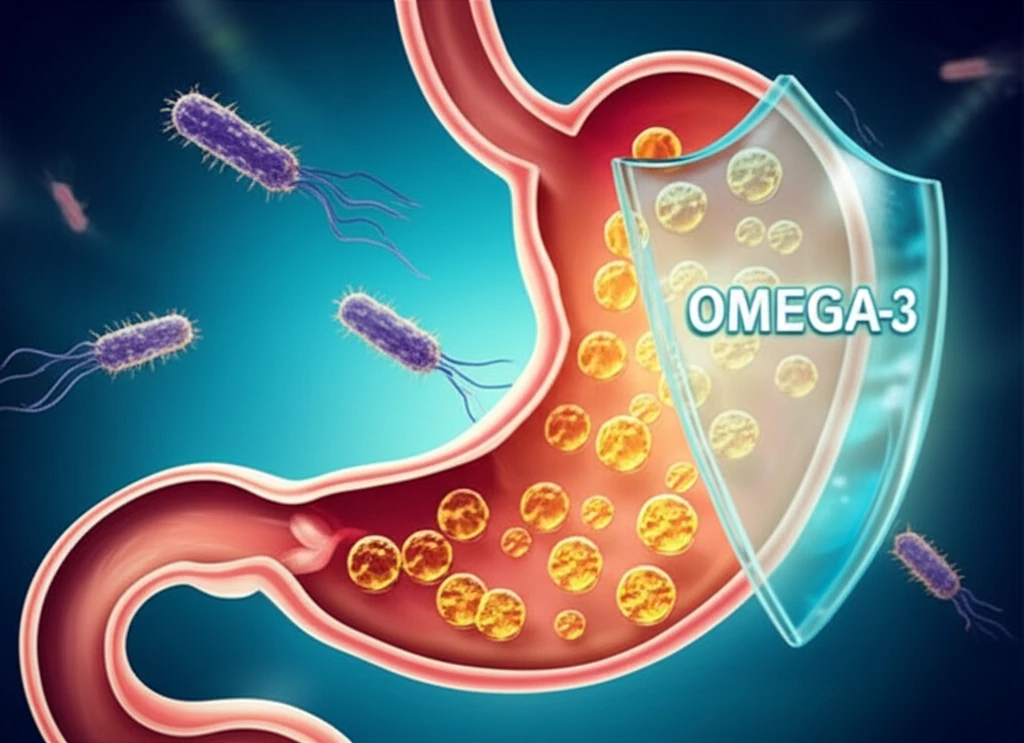
Omega-3s: Can These Fatty Acids Fight Stomach Troubles?
"Uncover how omega-3 polyunsaturated fatty acids (PUFAs) could be a game-changer in managing Helicobacter pylori (H. pylori)-related gastric diseases, offering a non-antimicrobial dietary approach for a healthier gut."
Gastric cancer ranks as the fourth most common cancer globally and the second leading cause of cancer-related deaths. A key culprit in gastric carcinogenesis is Helicobacter pylori (H. pylori) infection, a major risk factor for both gastritis and gastric carcinoma. While factors like host genotype, bacterial virulence, and environmental conditions can heighten the risk, the slow progression from H. pylori infection to chronic inflammation sets the stage for gastric cancer development.
H. pylori's ability to thrive in the harsh acidic environment of the stomach allows it to adhere to gastric epithelial cells, triggering inflammation. This, in turn, leads to the recruitment of immune cells and the production of reactive oxygen and nitrogen species, contributing to gastric epithelial cell damage and, potentially, carcinogenesis.
Omega-3 polyunsaturated fatty acids (n-3 PUFAs), such as eicosapentaenoic acid (EPA) and docosahexaenoic acid (DHA), have gained recognition as essential long-chain fatty acids. These offer benefits ranging from promoting optimal health to rescuing individuals from chronic inflammatory diseases, including atherosclerosis, fatty liver, and various inflammatory gastrointestinal disorders. Emerging research into EPA and DHA has sparked significant interest, particularly with the identification of GPR120, its receptor, a G protein-coupled receptor. This article explores the potential of n-3 PUFAs in reducing H. pylori-associated gastric diseases and even preventing gastric cancer by influencing factors like proliferation, survival, angiogenesis, inflammation, and metastasis.
Omega-3s: Your Gut's New Best Friend?

Western diets, often high in the ratio of n-6 to n-3 PUFAs, have been linked to the development of various cancers, including those of the esophagus, breast, stomach, colon, pancreas, and prostate. However, n-3 PUFAs possess multiple beneficial antitumor functions that have demonstrated the ability to alter malignant growth in several studies.
- Anti-Inflammatory Powerhouse: n-3 PUFAs are widely recognized for their anti-inflammatory properties, which are crucial in combating inflammatory diseases.
- Gut Guardian: They've been shown to protect against chronic inflammatory diseases affecting the gut.
- Cancer Risk Reduction: Some studies even suggest n-3 PUFAs can play a role in reducing the risk of certain cancers.
The Future of Omega-3s in Gastric Health
H. pylori is classified as a class 1 carcinogen by the IARC, underscoring the importance of strategies to prevent associated gastric cancer. Host adaptive responses can modify the carcinogenic influence of H. pylori infection. N-3 PUFAs, known for their antioxidant, anti-inflammatory, and anticancer properties, are under investigation for their effects on H. pylori-induced gastric diseases.
Accumulating evidence suggests that higher consumption of dietary n-3 PUFAs is associated with a lower risk of GI cancer development. Recent studies propose that endogenous n-3 PUFAs delay the progression of stomach cancer, suggesting that elevating n-3 PUFAs could be an important strategy to delay or prevent gastrointestinal cancer in high-risk patients.
Supplementation with n-3 PUFAs, possibly in combination with other antitumor agents, may improve the efficacy of GI cancer prevention. Further research is needed to fully demonstrate the preventive or therapeutic effects of n-3 PUFAs against H. pylori-induced gastric diseases, making clinical trials essential for determining their role in H. pylori-associated gastric conditions.
